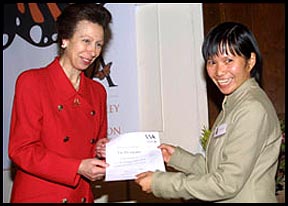Vu Thi Quyen Receives Maurice Laing Award
 Her Royal Highness Princess Anne presents Vu Thi Quyen the Maurice Laing Award. |
THE WHITLEY AWARDS FOUNDATION, LONDON, 08 FEBRUARY 2001) — The winners of the world’s premier conservation awards, were announced last evening by HRH The Princess Royal at the Royal Geographical Society, London. The Maurice Laing Award (£20,000) was awarded to Vu Thi Quyen, Education for Nature, Vietnam
Vu Thi Quyen’s work in environmental education programmes in Vietnam has produced pioneers in community-based environmental education. Vietnam is one of Asia’s top priority areas for conservation action, but is faced with many difficulties in the upkeep of its protected areas and national parks, including poaching and deforestation. Ms. Quyen has been running a Conservation Awareness Programme at the Cuc Phuong National Park, which has helped raise awareness among 15,300 children living along the border of the park. She is now expanding these efforts throughout the country with the establishment a new Vietnamese organisation: Education for Nature — Vietnam (ENV), which will help train staff from other protected areas to develop successful conservation education programmes. Ms Quyen was described by a referee as “rare among her peers” and her work a model for the whole Indo-China region.
Vietnam’s forests are disappearing: from covering 44% in 1943, today they have been reduced to an estimated 15%. They are now small islands of biodiversity amidst a sea of 79 million people. They are under continued threat from hunting, logging, and collection of other forest products and conversion to agriculture.
In 1996, when it had become apparent that enforcement alone was not the answer to protection of these remaining forests, Flora and Fauna International (FFI) set up an educational training programme based around the Cuc Phuong National Park, led by a dynamic individual, Ms. Vu Thi Quyen.
In four years, after initial technical assistance from FFI, Ms. Quyen has undertaken a mammoth task. The Cuc Phuong Conservation Project has set up community-based environmental education programmes right around the park. Conservation Clubs are now active in 45 schools bordering the park, and involve more than 15,300 primary and middle school students. An adult-focussed conservation education project reaches all 16 communes bordering the park.
Along with basic conservation education programmes, Ms. Quyen’s organisation has successfully transferred the management of the education programme to national staff and local leadership. Practising a “learning by doing” approach, this pragmatic approach has been highly successful. As a result, there has been a significant shift among policymakers away from simple enforcement to a change in the environmental behaviour in the communities who live there.
Against considerable obstacles, Ms. Quyen has overcome the low level of education, corruption, and nepotism by building capacity and developing a uniquely Vietnamese response to environmental education.
Lately, the staff at the training centre have expanded their activities to deliver specialised training programmes for ranger staff and others from nearby parks, as well as those from as far away as Cambodia, making the project a model for the entire Indo-Chinese region.
The project’s newsletter has been described “as the most informative and analytical conservation newsletter in Vietnam, bar none”.
Ms. Quyen is now in the process of setting up Vietnam’s first-ever non-governmental conservation organisation, Education for Nature-Vietnam (ENV) and a training centre that will teach people around the country about their participatory approach to community conservation education.
She is highly thought of in both international and national circles. One colleague says of her work: “The key to her success has been her emphasis on quality training and practice for her personnel, a system of rewards and incentives for achievement within the project and a great sense of humour. Ms Quyen gives the project and the members of her team, twenty four hours a day, seven days a week. Because of such credible leadership, the team exhibits a professional pride and camaraderie that rivals any I have seen, anywhere”.
![]()
About the Whitley Awards
The Whitley Awards Foundation rewards individuals who are implementing pragmatic and long-lasting projects conservation measures, which preserve natural biodiversity within a human context.
Set up in 1993 with a single prize of £15,000, the scheme was joined by the Iris Darnton Foundation, the Rufford Foundation, and the Maurice Laing Foundation. Today the awards range from £50,000 to £5000. The Trustees of the Whitley Awards Foundation now dispense more than £400,000 a year in awards grants. This year two new partners have contributed awards: the Ashden Trust with the Ashden Award for Renewable Energy and Sting and Trudie Styler with an award for human rights and the environment.
For additional information, see 2001 Whitley Award Winners Announced.